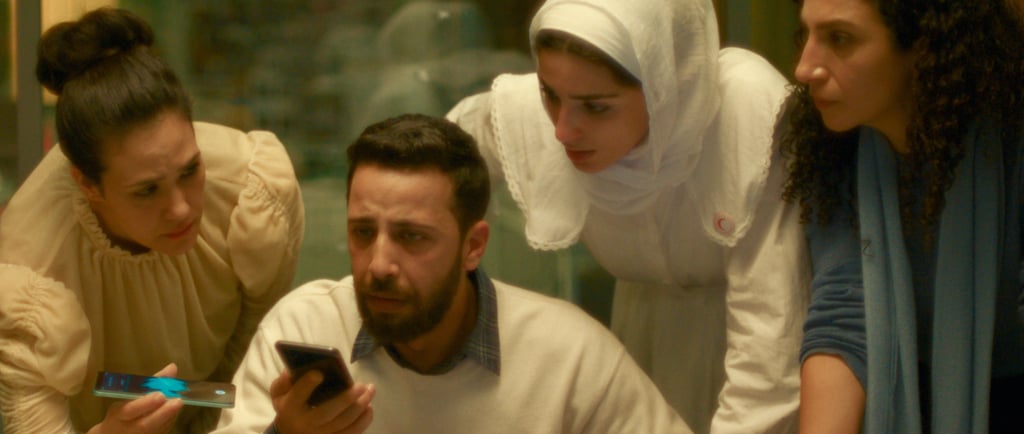The Voice of Hind Rajab: A Cry the World Did Not Answer
REVIEWS
Mia Pflüger
9/3/2025


On January 29, 2024, the Palestine Red Crescent Society received an emergency call unlike any other. Six-year-old Hind Rajab was on the line, trapped in a car in Gaza as Israeli tank fire killed her family. For more than an hour she pleaded, her small voice raw with terror and exhaustion: “Please come and get me, there’s shooting here.” The volunteers tried everything: calming words, promises of rescue, dispatching an ambulance, but the ambulance was destroyed before it reached her, its two medics also killed. Investigators later counted 355 bullets fired into Hind’s family’s car. At 7:30 p.m., her voice went silent.
Fragments of those calls circulated online, becoming one of the most haunting records of the war in Gaza: heard around the world, yet unanswered. Tunisian director Kaouther Ben Hania, whose cinema has always balanced documentary and fiction, has transformed that tragedy into The Voice of Hind Rajab, an 89-minute feature that feels at once like testimony and memorial. The opening title card makes its terms clear: “This is a dramatization based on real events. The emergency calls were recorded that day.” The warning is chilling, but the reality that follows is even harsher. If anything, the film underplays what must have been unendurable.
The setting is confined to the Palestine Red Crescent control room, recreated with meticulous care. Palestinian actors portray the medics, but the core of the film is Hind’s real voice, preserved from the original 70-minute recording. Nothing is polished away: the static, the distortion, the pauses where silence itself feels like a scream. The camera stays close on the medics’ faces. Every flicker of grief, every held-back tear, every moment of helplessness is visible.
Professionals trained to stay calm are undone by a child begging for her life. For long stretches, the film crawls under the skin, Hind’s words repeating, pleading not to be left alone. The volunteers promise, “We are coming.” Yet we know, as perhaps they too feared, that the promise will never be kept. The effect is unbearable. Not only the medics, but the audience too, is left speechless, devastated.
“The Voice of Hind Rajab“ is especially astonishing when it comes to the sound design: the static and distortion of the original recordings are preserved, allowing Hind’s voice to occupy the space with full, terrifying immediacy. The editing is precise and unrelenting, weaving long stretches of silence and tension that pull the viewer directly into the medics’ experience. Palestinian actors Saja Kilani, Motaz Malhees, Clara Khoury, and Amer Hlehel work together to hold the immense density of the story in their ensemble, delivering subtle, deeply human performances. Every twitch, every sigh, every flash of helplessness is visible, making the audience feel as though they are part of Hind’s story at every step. Ben Hania’s direction is spare and restrained, yet the weight of helplessness fills the room. Even giving everything may not be enough, and that truth crushes everyone: the medics, the child, and the viewers alike. For long minutes, Hind appears only as a silhouette, a blurry photograph taped to a desk like a wanted poster.
Ben Hania’s direction is spare, restrained, yet the weight of helplessness fills the room. Even giving everything may not be enough, and that truth crushes everyone: medics, child, and viewers alike. For long minutes Hind is only a silhouette, a blurry photo taped to a desk like a wanted poster. Then, suddenly, we see her as she truly was: a girl smiling in photographs, laughing, carefree, posing as any six-year-old might. The moment freezes the blood. The faceless voice on the line is revealed as a child with a life ahead of her, and that realization becomes the turning point of the film: one of those cinematic instants when the world tilts and nothing can be undone.
The experience resembles the most intense thriller of the year: a desperate race against time, every second tightening its grip, night falling both outside the window and inside the story. As the light fades from the sky, it fades for Hind as well. Fragile sparks of hope are swallowed almost immediately by despair. But unlike a thriller, there is no escape, no catharsis. Only silence.
This is the riskiest movie of the festival: not because of the real story or the Palestine factor, but because turning a real-life tragedy from just 18 months ago into a dramatized feature could have easily become sentimental or exploitative. Ben Hania makes the absolutely right choice: she uses the drama format, but with a directorial style drawn from her documentaries, and she inserts a crucial element that is entirely real. The actors and the recreated control room interact with the real recordings, mirroring reality until, finally, reality takes control. What was lurking under the narration becomes the undeniable point: this is happening. It is an incredible demonstration of humanity and a profound understanding of cinema in a single compact film.
Heartbreaking and essential, “The Voice of Hind Rajab“ should be supported by anyone who believes in the power of film. The work with archival footage and the recordings is integral; even knowing the story, the audience remains alert throughout. The dramatization enhances the emotional reach without diminishing the truth, if it helps the film reach a broader audience and call for empathy, it is more than justified. There is a moment when the medics try to soothe her by guiding her away from the terror outside her window. They tell her to breathe, to think of flowers, to remember how it feels to walk barefoot, how peaceful it is when the waves crash against the shore. Hind wanted the war to end so she could return to the beach. She never did. And yet, in a way, she has. Through this film, her voice returns to us like the tide: unstoppable, unforgotten, carrying its weight of salt and sorrow.
The race for Best Picture is already over. In a fair world, “The Voice of Hind Rajab“ would at least get the peace she wanted. The sea remembers everything. Waves crash and retreat, but they always return. So too with Hind’s voice. Each repetition of “Come and get me” hits the shore of our conscience. Her unanswered cries pull us into darker waters, and the beach she longed for becomes a place we carry within ourselves. Cinema has given her back what war took away: not her life, but her presence. She is there in the hush before the wave breaks, in the foam dissolving on the sand, in the horizon that promises an endless tomorrow. Hind’s spirit has returned to the sea she loved, and there she will remain, calling to us through every tide. The water carries her, the beach holds her, and the waves will whisper her name as long as there is a world to listen.
